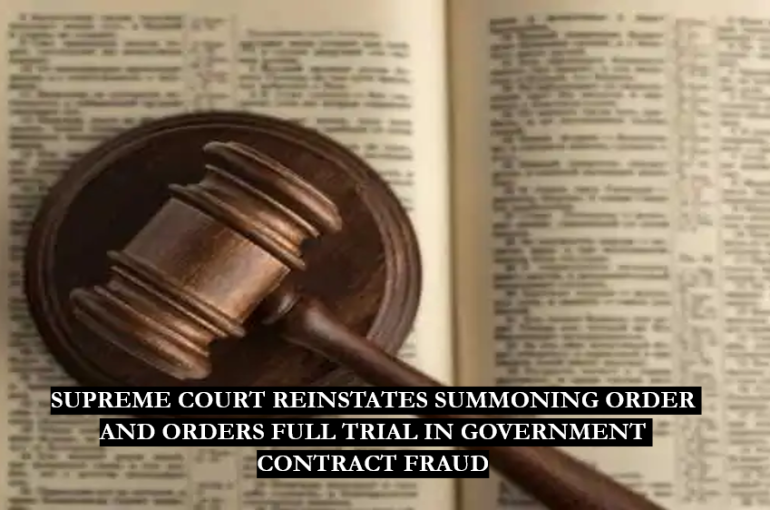SUPREME COURT REINSTATES SUMMONING ORDER AND ORDERS FULL TRIAL IN GOVERNMENT CONTRACT FRAUD
Introduction
In a significant ruling by the Supreme Court of India in the matter SLP (CRL.) NO. 1500 OF 2024 and SLP (CRL.) NO. 1660 OF 2024 of Dharambeer Kumar Singh Vs. The State Of Jharkhand & Anr. decided on 06.08.2024 had reinstated the Summoning Order against M/s SS Infrastructure Co. and its partners, Santosh Kumar Choudha, Sandhya Choudha, and Rajeev Choudha in a case involving allegations of forgery and fraud to secure a Government Contract.
Case Background
The controversy began with an Application filed by Dharambeer Kumar Singh, Petitioner under Section 156(3) of the Code of Criminal Procedure, 1973, against M/s SS Infrastructure Co and its partners. The Petitioner accused the Firm of two primary offences: non-payment for subcontracted work and obtaining a lucrative contract through fraudulent means. The contract in question was the Namna Ankiat Project, part of the Jinjoyi Irrigation Scheme in Palamau, Jharkhand, valued at over ₹35 crore.
Allegations of the Petitioner
The accusations of the Petitioner were two-fold. Firstly, the Petitioner alleged that Santosh Kumar Choudha, a partner at M/s SS Infrastructure Co, submitted forged documents to demonstrate the requisite experience needed for the contract. The contract was related to the Namna Ankiat Project, involving extension, restoration, and modernization work under the Jinjoyi Irrigation Scheme in Palamau, Jharkhand. While the Firm claimed experience of handling projects worth Rs. 18.4 crore, the actual experience was significantly lower, only around Rs. 3.4 crore. And secondly, the Complainant, who worked as a subcontractor, claimed that an amount due to him was not paid by the main contractor, Santosh Kumar Choudha (Respondent No. 2).
The investigating agency initially submitted its first final report on 31.10.2020, citing a lack of evidence. Dissatisfied with this conclusion, the Appellant filed a protest petition. In a detailed Order dated 12.02.2021, the Ld. Magistrate noted significant lapses and defects in the investigation, indicating that further investigation was necessary to serve justice.
Despite this directive, the investigating agency submitted a second final report, again claiming insufficient evidence against the Accused. However, the Magistrate observed that the witnesses’ statements clearly indicated that the documents were fabricated. Furthermore, the Magistrate noted that the informant himself had fabricated the documents. Despite this, Santosh Kumar Choudha (Respondent No. 2) was not eligible for the tender, had bid for the same and been granted the tender based on false and fabricated documents. The Magistrate highlighted that the Respondents were the beneficiaries of this fabrication, and the matter of document fabrication was deemed a trial issue. Consequently, a Summoning Order was issued on 31.01.2022.
Aggrieved by the Summoning Order, the Respondents filed an Application to quash both the Summoning Order and the pending criminal proceedings before the Judicial Magistrate, 1st Class Palamau, before the High Court of Jharkhand.
High Court Proceedings
In the High Court of Jharkhand, the Respondents successfully quashed the Summoning Order and the criminal proceedings initiated by the Petitioner. The High Court’s decision was based on the examination of the case diary and statements which suggested that the Petitioner himself might have manipulated the documents. Consequently, the High Court found insufficient grounds to proceed against Respondent No. 2 and his partners.
Supreme Court’s Intervention
Unhappy with the High Court’s ruling, the Petitioner escalated the matter to the Supreme Court. The Apex Court, from their findings, found that the High Court had overstepped by evaluating the merits of the case at a preliminary stage. The Supreme Court, emphasized that the role of the High Court was not to conduct a mini-trial but to determine whether there was a prima facie case warranting a trial.
The Supreme Court highlighted the necessity of a trial to thoroughly examine the allegations of forgery and the respondents’ involvement. It noted that the High Court had failed to appreciate that the Petitioner, despite his alleged involvement, was an employee at the time and that the primary beneficiary of the Contract obtained through fraudulent means was Santosh Kumar Choudha.
Conclusion
Setting aside the High Court’s decision, the Supreme Court remanded the case back to the Judicial Magistrate for a full trial. By this judgment, the Supreme Court reinstated the Summoning Order and directed that the Accused were to face trial for the alleged offences.
The Supreme Court’s Order reaffirms the principle that questions of fact, especially in complex fraud and forgery cases, should be resolved through a comprehensive trial process rather than premature judicial intervention.
Kartik Khandekar
Senior Associate
The Indian Lawyer & Allied Services





































Leave a Reply